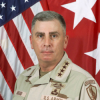John Abizaid

John Abizaid
John Philip Abizaidis a retired United States Army general and former U.S. Central Commandcommander, overseeing American military operations in a 27-country region, from the Horn of Africa, the Arabian Peninsula, to South and Central Asia, covering much of the Middle East. CENTCOM oversees 250,000 US troops. Abizaid succeeded General Tommy Franks as Commander, USCENTCOM, on July 7, 2003, and was also elevated to the rank of four-star general the same week. He was succeeded by Admiral William J. Fallon on...
NationalityAmerican
ProfessionSoldier
Date of Birth1 April 1951
CountryUnited States of America
If a legitimate government emerges that is broadly seen as being representative of Sunni, Shia and Kurdish interests, I think there is no reason to suppose that we can't bring force levels down in the spring,
If a legitimate government emerges in Iraq that is broadly seen as being representative of Sunni, Shia and Kurdish interests, I think there's no reason to suppose that we can't bring force levels down in the spring,
is to build an Iraqi security capacity, all the way from the police level up to the national army level, that is militarily effective and loyal to the established civil government.
I do think there is a general lack of understanding in the United States as to how it's going,
I don't believe Iran is a suicide state.
Nobody's more mindful of the sacrifices of our troops than those of us that command them.
And so I think that if the person has the funds, the network, and the equipment to do this, and also the experience, which is the key factor, then they can be quite deadly.
So, these political activities will create friction in and of themselves, and in this environment of friction there'll be additional violence.
You know as well as I do that counterinsurgency is a very nuanced type of military operation.
The power to prevent violence is a power that no police force seems to have anywhere in the United States.
But as we move from this period of what many Iraqis regard as perceived occupation, we need to move towards one of partnership.
As far as Zarqawi is concerned, there is a network of extremists; it's not just Zarqawi.
We've got to ensure that the quality and the capability of these forces will be good enough to withstand the challenges that the insurgents and the terrorists will present to the new Iraqi government.
Certainly our goal is to leave Iraq, but we can't leave Iraq with our forces until we know that the Iraqi security forces are capable and efficient enough to defend the sovereignty of the nation.